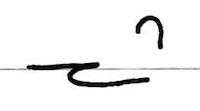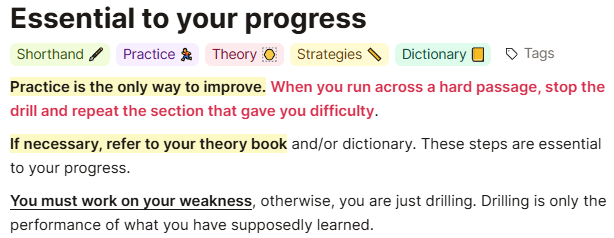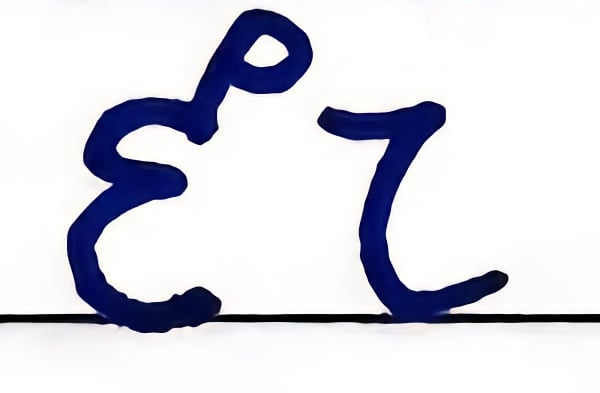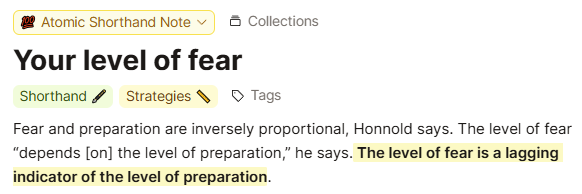LLTT Newsletter - August 2025

LLTT - August 2025
Welcome back!
The Unprepared Dictation Trap: Why Students Plateau and How to Break Free

For many Teeline students, unprepared (unseen) dictation feels like the "real thing." It's challenging, authentic, and seems like the fastest path to improvement. After all, this mirrors what you'll face in NCTJ examinations and professional situations, so surely spending most, if not all, of your practice time on unprepared passages makes sense?
However, this logic (while understandable) creates one of the biggest obstacles to shorthand progress. Students caught in this trap find themselves in a frustrating cycle: taking dictation after dictation, struggling with the same words repeatedly, making identical errors, and wondering why their speed and accuracy plateau despite hours of work.
The Progress Illusion
Taking unprepared dictation feels productive. You're actively writing, filling pages with shorthand, and working hard. This creates a sense of accomplishment until you attempt transcription and discover your notes are riddled with gaps, unclear outlines, and sometimes missed passages. This can lead to what we call "practice theatre": the appearance of meaningful practise without actual improvement. Students often report spending hours each week on dictation practise, yet see minimal actual results.

Consider the typical scenario: A student encounters "psychological" in a passage, hesitates over the outline, writes something unclear, and simply moves on. The same word appears in next week’s passage, and the same hesitation occurs. Without proper intervention, this pattern can persist for months.

Why Unprepared-Only Practice Fails
When you're focused on keeping up with dictation speed, there's tremendous pressure to write something rather than nothing. Unless you are careful, this environment can encourage sloppy outlines, inconsistent letter formation, and rushed shortcuts that may work occasionally, but fail under pressure. Further, bad habits, once established, become remarkably difficult to break.
Perhaps most frustratingly, students who rely primarily on unprepared dictation often find themselves stuck at particular speed levels. They might comfortably handle 60 wpm passages but consistently struggle at 80 wpm, regardless of how many 80 wpm passages they attempt. This plateau occurs because unprepared dictation tests existing abilities rather than developing new ones.
NCTJ Pressure
Journalism students face additional pressure from NCTJ speed requirements, where 100 wpm competency is the required standard. This creates understandable urgency to practise at (or near) target speeds, leading many to attempt unprepared dictations beyond their current ability.
This usually backfires: students get increasingly frustrated by repeated failure at higher speeds, when steady prepared work would have built the foundations they actually need.
The Learning Problem
Educational research distinguishes between learning activities (which build new abilities) and performance activities (which demonstrate existing abilities).
Shorthand is no different.
Unprepared dictation is primarily performance-based: it reveals what you can currently do but doesn't necessarily expand those abilities. When taking unprepared dictation, your brain is trying to execute on many demanding tasks at once: processing unfamiliar vocabulary, converting sounds to shorthand outlines, maintaining writing speed, following meaning, and managing anxiety. This mental overload makes it difficult to learn new patterns or strengthen existing knowledge.
The alternative approach - prepared dictation - reduces this load by addressing vocabulary and outline challenges in advance, allowing you to focus on fluency and speed development.
The Feedback Problem
With unprepared dictation, you take the passage then transcribe your notes. The problem is most students don't properly analyse what went wrong. You might spot missed words or messy outlines, but without spending time working out why an issue may have occurred, you're likely to repeat the same mistakes. Even when you do try to analyse errors, you're often left guessing about the root cause.
Breaking Free
You might be caught in this trap if you take dictation regularly but see little improvement, make the same errors repeatedly, feel increasingly anxious rather than confident, or find yourself plateaued at a particular speed level despite continued practice.
Breaking free requires embracing preparation as proper and necessary skill development. View prepared dictation as investment rather than inefficiency. Accept a slower initial pace in exchange for more reliable long-term progress.
Students who embrace proper preparation may initially feel like they're progressing more slowly, but they ultimately achieve higher speeds, greater accuracy, and more confidence than those who attempt shortcuts. Think of prepared dictation not as a detour from your destination, but as building the roads that will carry you there reliably and efficiently.
Your future professional self will thank you for the patience to prepare properly. The difference between a shorthand writer who can sometimes manage unprepared dictation and one who can always deliver reliable results lies not in natural talent, but in the wisdom to prepare properly.
Unprepared dictation definitely has its place - after all, if you take a speed test, this is exactly what you need to be prepared for! But relying on it as your primary (or only) practice method creates more problems than it solves. The constant pressure to keep up encourages bad habits, the lack of proper analysis prevents real improvement, and the mental overload makes it nearly impossible to learn new skills while practising existing ones.
If you've been wondering why your shorthand isn't improving despite hours of practise, the answer likely lies in how you're practising, not how much. Unprepared dictation tests what you already know—it doesn't teach you what you need to learn.
Coming Next Month
So if unprepared dictation is the trap, what's the escape route? Next month, we'll explore an approach that transforms struggling students into confident shorthand writers: Prepared Dictation. You'll discover why the most successful Teeline students spend most of their time on material they've seen before and why "cheating" by reading passages in advance isn't cheating at all — it's essential skill building that professional shorthand writers have used to their advantage.
The difference between students who plateau and those who breakthrough isn't talent or hours of practise. It's knowing how to practise. And we're going to show you how.
Remember: Every expert was once a beginner who chose to prepare rather than simply perform. Your willingness to embrace preparation today will determine your professional capabilities tomorrow.
Interesting Websites
https://www.thewordfinder.com/wordlist/Welcome to the Word List Database
Our database offers a comprehensive range of word lists, from lists of words starting with specific letters, to lists of words of a specific length. Our database serves as an excellent reference for any beginner word game player or anyone hoping to expand their vocabulary.
Observations on British and American English by an American linguist in the UK
https://separatedbyacommonlanguage.blogspot.com/2025/08/fly-tipping-fly-posting-post-no-bills.html

Be sure to visit us at the LLTT Website, YouTube, Facebook, Instagram, Quizlet and Soundcloud.
If you’re looking for Teeline reading practice, Skill Building Through Reading 📗 - is available for purchase online.
Much work (and ❤️!) has gone into this 48 page, 6x9 softcover book:
Five 5️⃣ carefully selected passages: Improve your sight 👁️ recognition of outlines and word groupings.
Dual Format: Each passage includes both printed Teeline and the longhand ✍️ transcription.
Proven Learning Approach: Reading printed 🖨️ shorthand is a method long-favoured by skilled practitioners.
Whether you're a student, journalist, or professional seeking to improve your note-taking, this book will be a valuable addition to your Teeline learning resources.
To order, please visit the book’s landing page or respond to this email with any questions.
If you find this newsletter helpful, please help us spread the word and forward to a friend!
A Parting Thought


Add a comment: